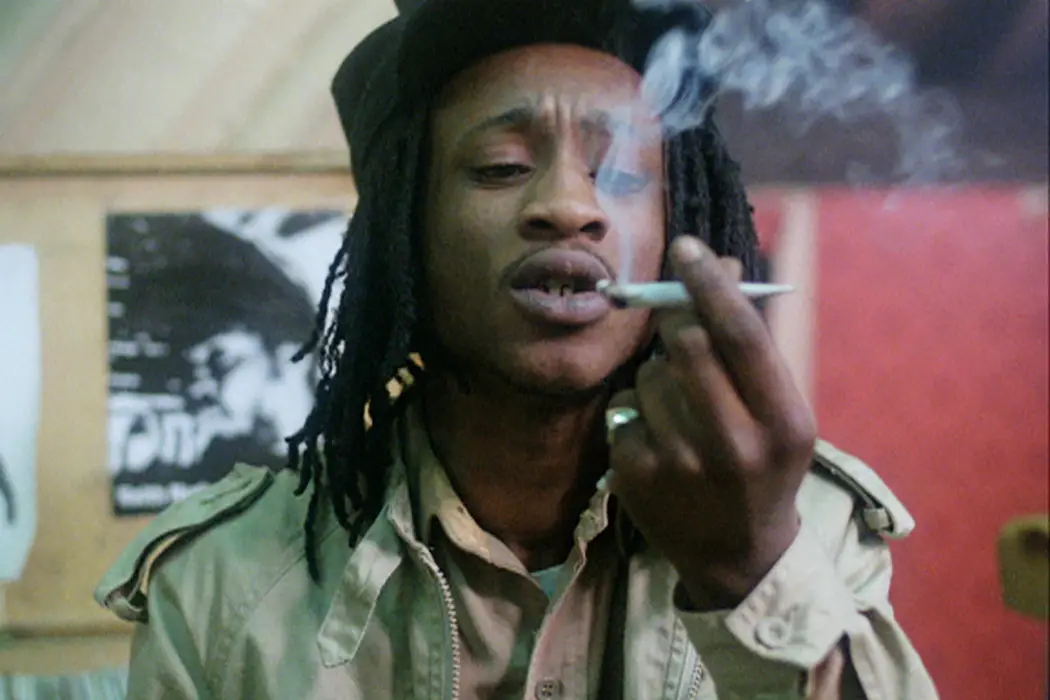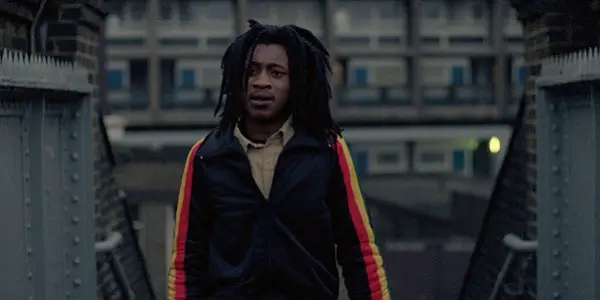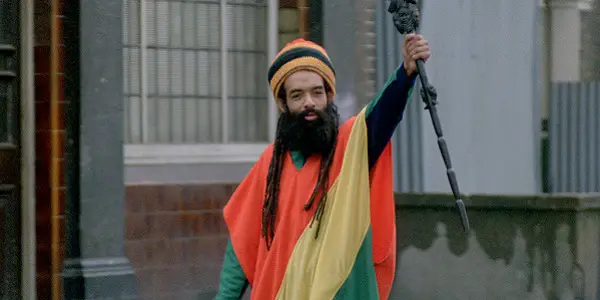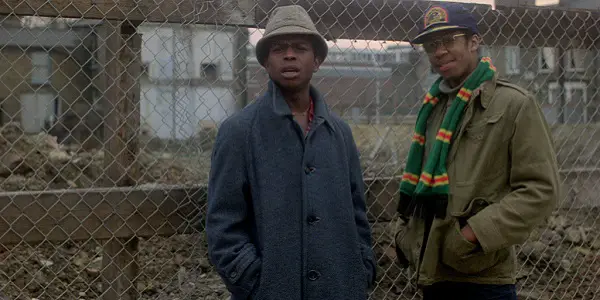BABYLON: A Piercing Portrait Of Racial Tension In Thatcher’s Britain

Lee Jutton has directed short films starring a killer toaster,…
Director Franco Rosso’s Babylon had its world premiere at Cannes in 1980 – an auspicious beginning, to be sure. However, later that same year the film was banned from the New York Film Festival for being “too controversial, and likely to incite racial tension.” Indeed, the film’s unflinching portrayal of a working-class musician dealing with racial violence and police brutality in South London’s Brixton neighborhood is often difficult to watch, but that is mostly because of how authentic it feels through each and every frame.
In England, the film was given an X rating just to keep young people out of the theaters, as the powers that be were worried that the film – and in particular, its dramatic conclusion – would lead to violent uprisings among black British youth.
Babylon never made it into theaters in the United States – until now. Newly restored and released by Kino Lorber in two versions – one with subtitles for the Jamaican patois spoken by the characters and one without – the film’s depiction of marginalized youth fighting back against a society that wants to stomp them out still resonates nearly forty years after its premiere.
This is England
David, known to his friends as Blue (Brinsley Forde of the reggae band Aswad), works as a car mechanic by day and a rising dancehall star by night as part of a crew called Ital Lion. The music – and in particular, a much-hyped music competition coming up – gives Blue his main motivation to keep going in a world that seems determined to stop him in his tracks.

Blue lives in the Brixton slums with his family, including a younger brother who escapes every time Blue tries to walk him to school. His white neighbors complain about his music and tell him and his friends that the country was lovely before they and their Caribbean brethren showed up. (Blue’s friend retorts, “This IS my country, lady and it’s never been lovely.”) His boss spews racial epithets at him and eventually fires him. And, he’s brutally beaten by a pair of cops who wrongfully charge him with a crime.
As the music competition looms on the horizon, Blue’s life begins to fall apart at the seams. Forced to go on the run from the police after the beating, he’s faced with the xenophobia and hatred of Margaret Thatcher’s Great Britain everywhere he turns. It’s no wonder that the film takes its name from the Biblical city of Babylon – a city symbolic of wickedness and decadence that Rastafaris equate with all that is evil and oppressive in Western society. For Blue, London is a wicked city that offers a promise of a better life, but just as quickly snatches it away with a snarl if you happen to have black skin.

The Power of Resistance
Co-written by Rosso and Martin Stellman (most famously Quadrophenia, most recently Idris Elba’s Yardie), Babylon’s script is rife with South London slang and Jamaican patois that add to the rich authenticity of the film’s atmosphere. I personally have a horrible ear and prefer to watch any and all films with the subtitles on if I can, so I truly appreciated being able to watch Babylon with subtitles, yet one doesn’t need to understand every word of the dialogue for the film to have an impact.
The fantastic soundtrack courtesy of British reggae legend Dennis Bovell and gritty cinematography from Academy Award winner Chris Menges (The Killing Fields, The Mission) are just as crucial, if not more so, to telling Blue’s story, and the performances from all involved are dynamite even if you don’t understand everything being said.
Babylon doesn’t shy away from portraying the vicious, hateful behavior of people who look at those who are different than them and feel instantly threatened. The film’s depictions of police brutality and institutional racism are particularly disturbing because one still sees stories similar to Blue’s making headlines today, in Great Britain and elsewhere. Yet even in the film’s darkest moments – and there are many – Babylon maintains a vibrant sense of life that cannot and will not be destroyed by hate.

In one moment that marks a turning point for Blue and the Ital Lion crew, the friends find their sound equipment smashed up and their rehearsal space daubed with swastikas and racist epithets. When one of the young men blames Ronnie (Karl Howman), the one white member of their group, he protests with a tinge of Jamaican patois coloring his own voice.
His reward for speaking this way is a headbutt, and an emotionally intense reminder that no matter how much he might think himself one of them, he will always have an advantage in society that they will not: the privilege of having white skin. He will never have to feel in danger merely for walking down the street the way they do every single day. It’s a powerful scene and one that continues to ring true today.
Babylon: Conclusion
Whether you opt for the subtitled version or not, one thing is for certain: Babylon is a hidden gem worth seeking out if it comes to your city. Pulsating with lively music and righteous anger, in a world that remains far too resistant to multiculturalism, it provides an uncomfortably vivid reminder that still we have not come far enough.
What do you think? Does Babylon sound like a re-release worth seeing in theaters? Share your thoughts in the comments below.
Babylon is released in NY on March 8, 2019 and in LA on March 15, 2019. You can find more release dates here.
Does content like this matter to you?
Become a Member and support film journalism. Unlock access to all of Film Inquiry`s great articles. Join a community of like-minded readers who are passionate about cinema - get access to our private members Network, give back to independent filmmakers, and more.
Lee Jutton has directed short films starring a killer toaster, a killer Christmas tree, and a not-killer leopard. Her writing has appeared in publications such as Film School Rejects, Bitch: A Feminist Response to Pop Culture, Bitch Flicks, TV Fanatic, and Just Press Play. When not watching, making, or writing about films, she can usually be found on Twitter obsessing over soccer, BTS, and her cat.













